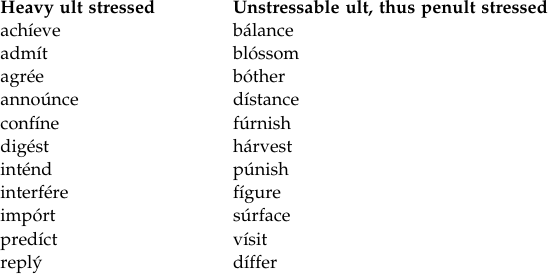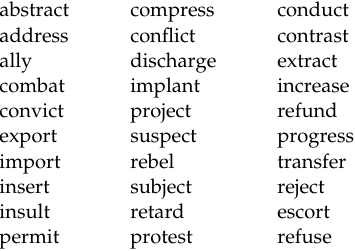
Verb Stress
 المؤلف:
Mehmet Yavas̡
المؤلف:
Mehmet Yavas̡
 المصدر:
Applied English Phonology
المصدر:
Applied English Phonology
 الجزء والصفحة:
P160-C7
الجزء والصفحة:
P160-C7
 2025-03-14
2025-03-14
 668
668
Verb Stress
If nouns and adjectives have the penult as their pivot, verb focus is on the ult. The general tendency is as follows: stress ult if heavy (branching rhyme); if not, go to the next left heavy syllable, as shown in the following:

With the above generalization, we can account for over 99 percent of the stresses of disyllabic words (Hammond reports 47.6 percent, or 987 out of 2,072, with heavy ult stressed, and 52.3 percent, or 1,085 out of 2,072, as penult-stressed because of unstressable ult). The few exceptions to the general tendency can be exemplified by the following, where penult is stressed despite the fact that the verb has a heavy ult:

There are not many trisyllabic verbs; however, they generally are predictable by the above rule. Hammond’s data state the following distribution: 39.5 percent (151 out of 378) heavy ult-stressed, 40 percent (157 out of 378) penult-stressed because of unstressable ult, and 18.5 percent (70 out of 378) antepenult-stressed because of unstressable ult and unstressable penult.
Before we conclude this section, it is worth noting that English has dozens of orthographically identical word-pairs differentiated by stress as nouns (penult stress) or verbs (ult stress), as exemplified in the following:

Although noun–verb shift is accomplished by a shift in stressed syllable in some of these (e.g. import, insult), in many others, the difference of stress is also accompanied by vowel reduction in the unstressed syllable, and thus these noun–verb pairs, although homographs, are not homophonous. For example:

Finally, not all two-syllable words that are both nouns and verbs follow the stress-switch rule. Some have the stress on the penult (e.g. accept, silence, triumph, harvest, promise) and others have it on the ult (e.g. surprise, delay, result) both nouns and verbs.
 الاكثر قراءة في Phonology
الاكثر قراءة في Phonology
 اخر الاخبار
اخر الاخبار
اخبار العتبة العباسية المقدسة


